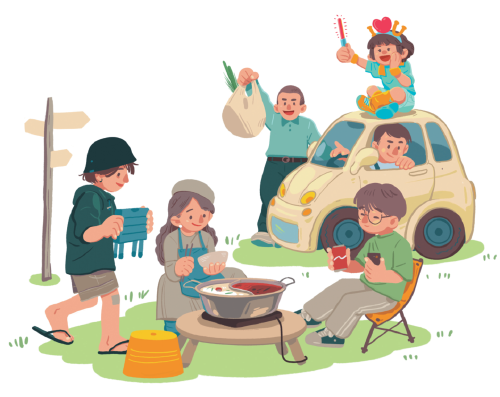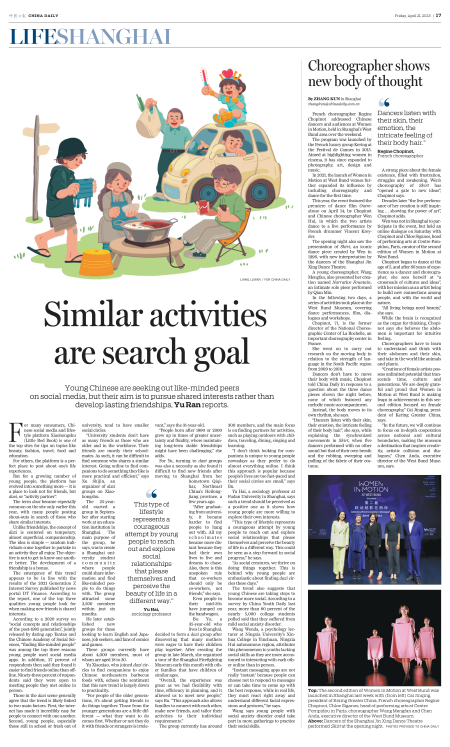

For many consumers, Chinese social media and lifestyle platform Xiaohongshu (Little Red Book) is one of the top sites for tips on topics like beauty, fashion, travel, food and education.
For others, the platform is a perfect place to post about one's life experiences.
But for a growing number of young people, the platform has evolved into something more — it is a place to look not for friends, but dazi, or "activity partner".
The term dazi became especially common on the site only earlier this year, with many people posting shout-outs in search of those who share similar interests.
Unlike friendships, the concept of dazi is centered on temporary, almost superficial, companionship. The idea is simple — random individuals come together to partake in an activity they all enjoy. The objective is not to get to know one another better. The development of a friendship is a bonus.
The emergence of this trend appears to be in line with the results of the 2021 Generation Z Interest Survey published by news portal DT Finance. According to the report, one of the top three qualities young people look for when making new friends is shared interests.
According to a 2020 survey on "social concepts and relationships of the post-1995 generation", jointly released by dating app Tantan and the Chinese Academy of Social Sciences, "finding like-minded people "was among the top three reasons young people used social media apps. In addition, 27 percent of respondents then said they found it easier to find friends online than offline. Ninety-three percent of respondents said they were open to meeting people they met online in person.
Those in the dazi scene generally agree that the trend is likely linked to two main factors. First, the internet has made it incredibly easy for people to connect with one another. Second, young people, especially those still in school or fresh out of university, tend to have smaller social circles.
"University students don't have as many friends as those who are older and in the workforce. Their friends are mostly their schoolmates. As such, it can be difficult to find someone who shares a similar interest. Going online to find companions to do something they like is more practical and efficient," says Xu Shijin, an organizer of dazi groups on Xiaohongshu.
The 25-year-old started a group in September after starting work at an education institution in Shanghai. The main purpose of the group, he says, was to create a Shanghai university student community where people could share information and find like-minded people to do things with. The group attracted some 2,500 members within just six months.
He later established new groups for those looking to learn English and Japanese, job seekers, and fans of comics and games.
These groups currently have about 4,000 members, most of whom are aged 18 to 30.
Yu Xiaoxiao, who joined dazi circles to find companions to enjoy Chinese northeastern barbecue foods with, echoes the sentiment that this new trend is largely down to practicality.
"For people of the older generations, it's about getting friends to do things together. Those from the younger generations are a little different — what they want to do comes first. Whether or not they do it with friends or strangers is irrelevant," says the 31-year-old.
"People born after 1990 or 2000 grew up in times of greater uncertainty and fluidity, where maintaining long-term stable friendships might have been challenging," she adds.
For Yu, turning to dazi groups was also a necessity as she found it difficult to find new friends after moving to Shanghai from her hometown Qiqihar, Northeast China's Heilongjiang province, a few years ago.
"After graduating from university, it became harder to find people to hang out with. All my schoolmates became more distant because they had their own lives to live and dreams to chase. Also, there is this unspoken rule that co-workers should only be co-workers, not friends," she says.
Even people in their mid-30s have jumped on the bandwagon.
Bu Yu, a 35-year-old who lives in Shanghai, decided to form a dazi group after discovering that many mothers were eager to have their children play together. After creating the group in late March, she organized a tour of the Shanghai Firefighting Museum early this month with other families that have children of similar ages.
"Overall, the experience was great as we had flexibility with time, efficiency in planning, and it allowed us to meet new people," says Bu. "This approach also allows families to connect with each other, make new friends, and tailor their activities to their individual requirements."
The group currently has around 300 members, and the main focus is on finding partners for activities, such as playing outdoors with children, traveling, dining, singing and learning.
"I don't think looking for companions is unique to young people nowadays as they prefer to do almost everything online. I think this approach is popular because people's lives are too fast-paced and their social circles are small," says Bu.
Yu Hai, a sociology professor at Fudan University in Shanghai, says such a trend should be perceived as a positive one as it shows how young people are more willing to explore their own interests.
"This type of lifestyle represents a courageous attempt by young people to reach out and explore social relationships that please themselves and perceive the beauty of life in a different way. This could be seen as a step forward in social progress," he says.
"As social creatures, we thrive on doing things together. This is behind why young people are enthusiastic about finding dazi circles these days."
The trend also suggests that young Chinese are taking steps to become more social. According to a survey by China Youth Daily last year, more than 80 percent of the nearly 5,000 college students polled said that they suffered from mild social anxiety disorder.
Wang Wenda, a psychology lecturer at Ningxia University's Xinhua College in Yinchuan, Ningxia Hui autonomous region, attributes this phenomenon to youths lacking social skills as they are more accustomed to interacting with each other online than in person.
"Instant messaging apps are not really 'instant' because people can choose not to respond to messages or can take time to come up with the best response, while in real life, they must react right away and understand different facial expressions and gestures," he says.
Wang says young people with social anxiety disorder could take part in more gatherings to practice their social skills.

